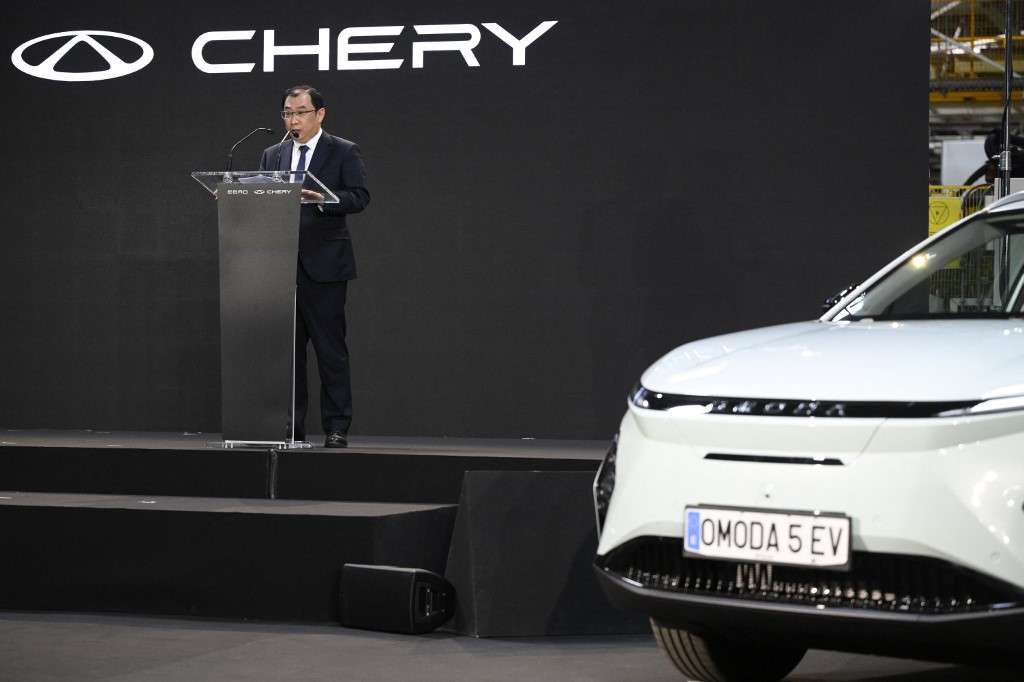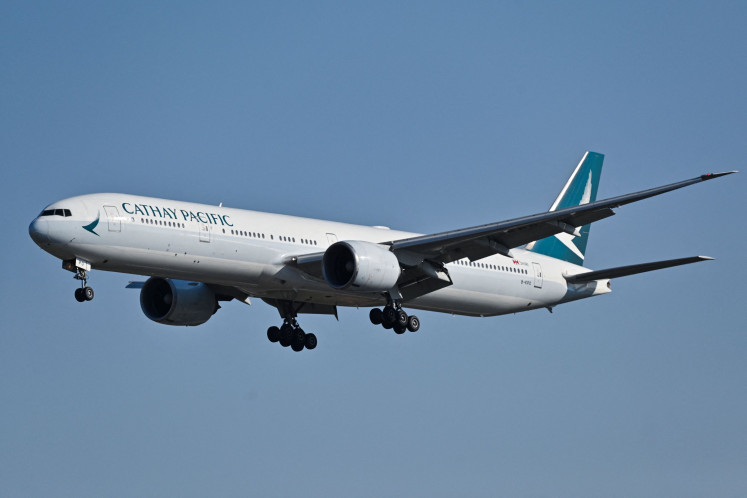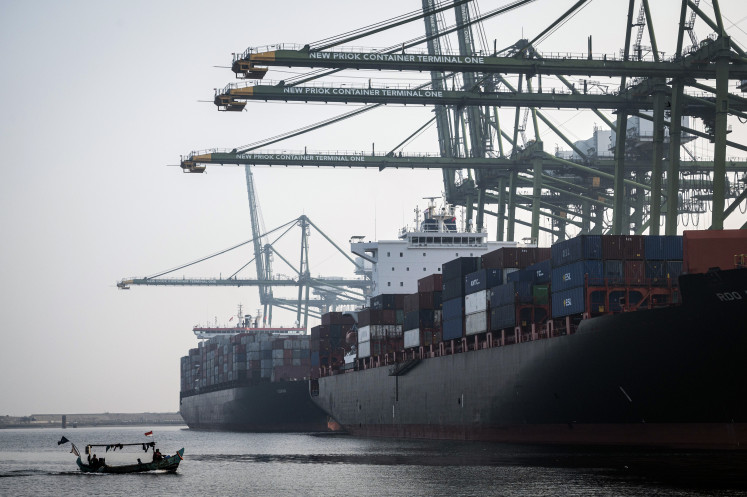Popular Reads
Top Results
Can't find what you're looking for?
View all search resultsPopular Reads
Top Results
Can't find what you're looking for?
View all search resultsEU set to disclose tariff rates for Chinese electric vehicles
The European Commission is this week expected to disclose the tariffs it plans to impose on Chinese electric vehicles due to what it says are excessive subsidies, a move likely to prompt stern words and possible retaliation from Beijing.
Change text size
Gift Premium Articles
to Anyone
 Chery International executive vice president Zhang Guibing delivers a speech after signing a joint venture agreement with Spanish group Ebro-EV Motors in Barcelona on April 19, 2024. Chinese carmaker Chery officialized that day its arrival in Spain, where it will produce locally-branded electric vehicles by the end of 2024. This move is another indication of Beijing's ambitions in the European market, amid an ongoing standoff with Brussels. (AFP/Josep Lago)
Chery International executive vice president Zhang Guibing delivers a speech after signing a joint venture agreement with Spanish group Ebro-EV Motors in Barcelona on April 19, 2024. Chinese carmaker Chery officialized that day its arrival in Spain, where it will produce locally-branded electric vehicles by the end of 2024. This move is another indication of Beijing's ambitions in the European market, amid an ongoing standoff with Brussels. (AFP/Josep Lago)
T
he European Commission is this week expected to disclose the tariffs it plans to impose on Chinese electric vehicles (EVs) due to what it says are excessive subsidies, a move likely to prompt stern words and possible retaliation from Beijing.
Less than a month after Washington quadrupled duties for Chinese EVs to 100 percent, Brussels will set almost certainly far lower tariffs for imports from Chinese makers such as BYD and Geely as well as western producers such as Tesla that export cars from China to Europe.
The move comes as European automakers are being challenged by an influx of lower-cost EVs from Chinese rivals. Still, there is virtually no support for tariffs from the continent's auto industry.
German automakers in particular are heavily dependent on sales in China – and thus fear retribution from Beijing – and European auto firms also import their own Chinese-made vehicles.
But European Commission President Ursula von der Leyen has repeatedly said Europe needs to act to prevent China from flooding the bloc's market with subsidized EVs.
"If provoked, the reaction and repercussions could lead to a trade war, which would be devastating for a region that is still heavily dependent on Chinese dominated supply chains in order to achieve its lofty climate goals," said Will Roberts, head of automotive research at Rho Motion.
China has rebuked the EU over the anti-subsidy investigation, urged cooperation and lobbied individual EU countries, but not fully spelt out what its response to tariffs would be.
Beijing has already launched an anti-dumping investigation into mostly French-made imports of brandy. It also passed a law in April to strengthen its ability to hit back should the United States or EU impose tariffs on exports of the world's No. 2 economy.
The EU's pre-disclosure notice comes a few weeks before the July 4 deadline for imposing provisional measures. They could though apply retroactively for the prior 90 days.
Interested parties will be given three working days to comment on the accuracy of the Commission's calculations.
The investigation will continue until late October, when a decision on whether to impose definitive duties, typically for five years, will be taken. Proposed duties would apply unless EU governments overwhelmingly oppose them.
That leaves time for a potential deal to be struck between Brussels and Beijing. Chinese executives hope such talks will soften the blow.
Analysts expect tariffs of between 10 percent and 25 percent.
Every additional 10 percent on top of the existing 10 percent levy would cost EU importers of Chinese EVs about $1 billion, based on 2023 trade data, another blow for a sector struggling with slowing demand and falling prices at home.
That cost will grow this year as Chinese EV makers expand exports to Europe.
Imports of China-made EVs have been dominated by western carmakers Tesla, Renault's Dacia and BMW, but the Commission has forecast that Chinese brands' share of EVs sold in the EU has risen to 8 percent from below 1 percent in 2019 and could reach 15 percent in 2025. It says prices are typically 20 percent below those of EU-made models.
Chinese models exported to Europe include BYD's Atto 3, SAIC's MG and Geely's Volvo.
Top executives at BMW, Mercedes and Volkswagen have warned against imposing import duties on vehicles from China, where HSBC estimates the German carmakers generate 20-23 percent of their global profits.
Among EU governments, France says Europe needs to defend itself against China's subsidized production, while German Chancellor Olaf Scholz has said he is not convinced of the need for tariffs.
Meanwhile the market is evolving as European automakers team up Chinese counterparts to bring EVs to market more cheaply and quickly.
Chinese EV makers and suppliers are also starting to invest in European production, which would avoid tariffs.
Executives at Europe's legacy carmakers told Reuters recently that stiffer tariffs might temporarily shrink or eliminate the cost advantage Chinese automakers gain from their supply chains.
But it will not prevent the reckoning that China's lower cost EVs will force on them.
Stellantis CEO Carlos Tavares said carmakers "don't have much time" to adjust their businesses and depended on the removal of "regulatory chaos and the bureaucracies that we have in our backyard".









